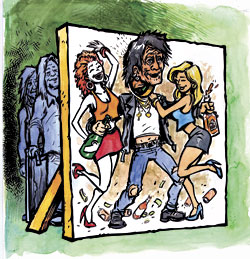On one hand, it shouldn’t be surprising that rapper Slug is insecure, considering he’s got one song called “They’re All Gonna Laugh @ You” and another which tells the fantastical story of a woman who would rather have sex with her own tattoos than with him.
Still, as one half of Minneapolis duo Atmosphere and a crucial player in the indie-rap scene since—well, since indie rap started, one would think he’d be comfortable with himself.
He nonetheless says self-doubt informed not just Atmosphere’s latest album, When Life Gives You Lemons, You Paint That Shit Gold—which recently debuted at #5 on Billboard—but also the children’s story which comes along with it (it’s actually for adults, in a McSweeney’s vein).
“A lot of my peers and contemporaries for years now have been giving me shit, directly or indirectly, about how they feel I dumb my music down,” Slug said in a recent phone interview. “Now, rather than consider that the only reason they say that is because I outsell them now, I actually get nervous about it. So I thought, as a joke, I would go all the way and write a children’s book. It doesn’t get any more simplistic than that.”
The book is a companion to the record, substituting fanciful metaphors (say, a magical goat) for the album’s hardscrabble characters (say, a working-class mother of two).
But forget about the magical goat for a second. The fact that Slug isn’t rapping about his own life is the real news flash. For Gold, he penned imagined stories about strangers he observed while sitting at a bus stop near his new house in South Minneapolis. Vagrants, single parents, and dope-addled fiends, they live, work, fuck, and wallow in their misery, giving the emotional indie rapper a chance to traffic in someone else’s self-righteousness and self-loathing for a change.
“I needed to learn how to teach myself some new tricks,” he says. “I looked back at my writing and it reminded me of eighth-grade creative-writing class. I [was] offering conflict, but I wasn’t offering any resolution. It’s like I didn’t make it to ninth grade. So one of the things I wanted to do was to start including resolution.”
And so he and Atmosphere producer Anthony Davis (aka Ant) overhauled the group’s sound and feel on Gold. Musically, Ant abandoned samples in favor of recording actual instruments, and lyrically Slug stitched together a series of self-encapsulated fictional tales. Starting with a trio of slow tracks, Gold feels more cohesive than—but not always as emotionally satisfying as—Atmosphere’s previous albums.
Some songs work, like “The Waitress,” about a homeless vagrant with a crush on a server, and “In Her Music Box,” told from the perspective of a young girl who idolizes her father. “She sings along like her daddy does,” Slug raps, “She knows all the words but she leaves out the bad ones/ Except ‘bitch’ she always sings the word ‘bitch’/Because it makes her daddy laugh, it’s her magic trick.”
And while there are resolutions in many of the songs, often Slug simply retreads familiar themes from someone else’s perspective. “Your Glasshouse,” about a remorseful woman who parties and sleeps around too much, falls flat because of its clichéd subject matter, which seems culled from movies and after-school specials. But the characters’ issues and insights are never too far removed from Slug’s own, and so the album feels just as personal as the duo’s previous works, while showcasing a bit of artistic evolution. Producer Ant, who was already at the top of his game on previous Atmosphere and Brother Ali efforts, has evolved as well, chopping up bass, guitar, and synth parts which were recorded under his direction. For these reasons, Gold feels less like the boilerplate, sample-driven indie-rap albums Atmosphere threatened to retire on and more like a groundbreaking work.
But you can rest assured that Slug, ever the self-critic, heads off doubters at the pass.
“I don’t think this record is the epitome of what can be done in [this] style, but I definitely think it’s a step in the direction for us to see how far we can go with it,” he says, adding a bit of the personal wisdom that makes him as engaging to talk to as he is to listen to. “I see it still as a continuation of the baby steps that we take, trying to make an album that’s going to make us happy forever.”








